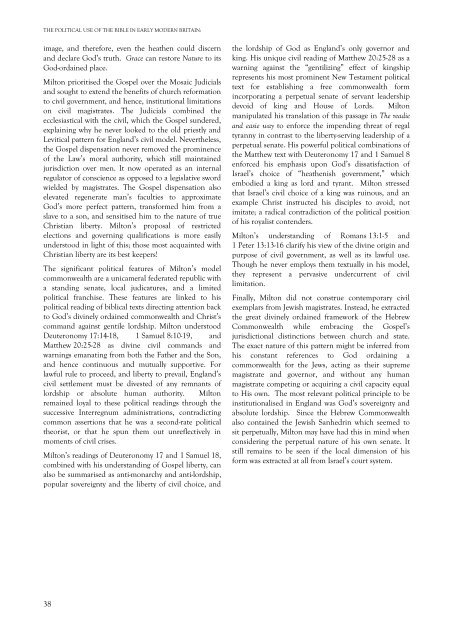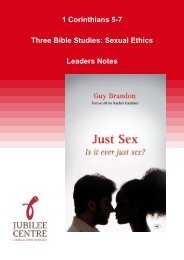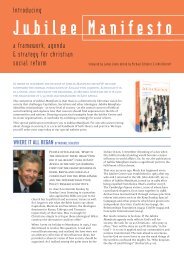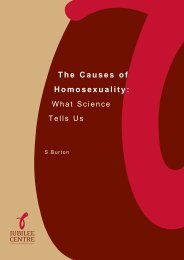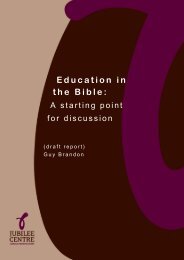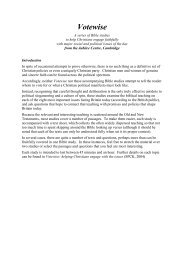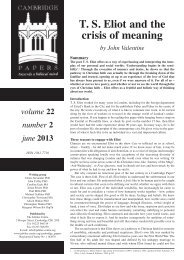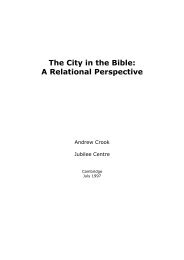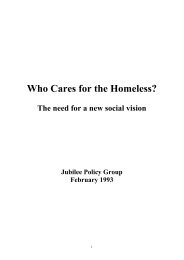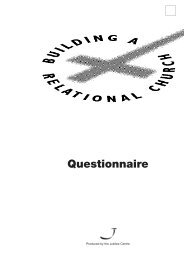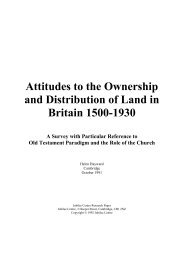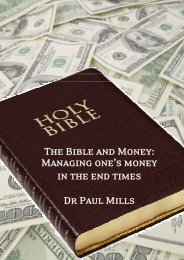Report Template - Jubilee Centre
Report Template - Jubilee Centre
Report Template - Jubilee Centre
You also want an ePaper? Increase the reach of your titles
YUMPU automatically turns print PDFs into web optimized ePapers that Google loves.
THE POLITICAL USE OF THE BIBLE IN EARLY MODERN BRITAIN:<br />
image, and therefore, even the heathen could discern<br />
and declare God’s truth. Grace can restore Nature to its<br />
God-ordained place.<br />
Milton prioritised the Gospel over the Mosaic Judicials<br />
and sought to extend the benefits of church reformation<br />
to civil government, and hence, institutional limitations<br />
on civil magistrates. The Judicials combined the<br />
ecclesiastical with the civil, which the Gospel sundered,<br />
explaining why he never looked to the old priestly and<br />
Levitical pattern for England’s civil model. Nevertheless,<br />
the Gospel dispensation never removed the prominence<br />
of the Law’s moral authority, which still maintained<br />
jurisdiction over men. It now operated as an internal<br />
regulator of conscience as opposed to a legislative sword<br />
wielded by magistrates. The Gospel dispensation also<br />
elevated regenerate man’s faculties to approximate<br />
God’s more perfect pattern, transformed him from a<br />
slave to a son, and sensitised him to the nature of true<br />
Christian liberty. Milton’s proposal of restricted<br />
elections and governing qualifications is more easily<br />
understood in light of this; those most acquainted with<br />
Christian liberty are its best keepers!<br />
The significant political features of Milton’s model<br />
commonwealth are a unicameral federated republic with<br />
a standing senate, local judicatures, and a limited<br />
political franchise. These features are linked to his<br />
political reading of biblical texts directing attention back<br />
to God’s divinely ordained commonwealth and Christ’s<br />
command against gentile lordship. Milton understood<br />
Deuteronomy 17:14-18, 1 Samuel 8:10-19, and<br />
Matthew 20:25-28 as divine civil commands and<br />
warnings emanating from both the Father and the Son,<br />
and hence continuous and mutually supportive. For<br />
lawful rule to proceed, and liberty to prevail, England’s<br />
civil settlement must be divested of any remnants of<br />
lordship or absolute human authority. Milton<br />
remained loyal to these political readings through the<br />
successive Interregnum administrations, contradicting<br />
common assertions that he was a second-rate political<br />
theorist, or that he spun them out unreflectively in<br />
moments of civil crises.<br />
Milton’s readings of Deuteronomy 17 and 1 Samuel 18,<br />
combined with his understanding of Gospel liberty, can<br />
also be summarised as anti-monarchy and anti-lordship,<br />
popular sovereignty and the liberty of civil choice, and<br />
the lordship of God as England’s only governor and<br />
king. His unique civil reading of Matthew 20:25-28 as a<br />
warning against the “gentilizing” effect of kingship<br />
represents his most prominent New Testament political<br />
text for establishing a free commonwealth form<br />
incorporating a perpetual senate of servant leadership<br />
devoid of king and House of Lords. Milton<br />
manipulated his translation of this passage in The readie<br />
and easie way to enforce the impending threat of regal<br />
tyranny in contrast to the liberty-serving leadership of a<br />
perpetual senate. His powerful political combinations of<br />
the Matthew text with Deuteronomy 17 and 1 Samuel 8<br />
enforced his emphasis upon God’s dissatisfaction of<br />
Israel’s choice of “heathenish government,” which<br />
embodied a king as lord and tyrant. Milton stressed<br />
that Israel’s civil choice of a king was ruinous, and an<br />
example Christ instructed his disciples to avoid, not<br />
imitate; a radical contradiction of the political position<br />
of his royalist contenders.<br />
Milton’s understanding of Romans 13:1-5 and<br />
1 Peter 13:13-16 clarify his view of the divine origin and<br />
purpose of civil government, as well as its lawful use.<br />
Though he never employs them textually in his model,<br />
they represent a pervasive undercurrent of civil<br />
limitation.<br />
Finally, Milton did not construe contemporary civil<br />
exemplars from Jewish magistrates. Instead, he extracted<br />
the great divinely ordained framework of the Hebrew<br />
Commonwealth while embracing the Gospel’s<br />
jurisdictional distinctions between church and state.<br />
The exact nature of this pattern might be inferred from<br />
his constant references to God ordaining a<br />
commonwealth for the Jews, acting as their supreme<br />
magistrate and governor, and without any human<br />
magistrate competing or acquiring a civil capacity equal<br />
to His own. The most relevant political principle to be<br />
institutionalised in England was God’s sovereignty and<br />
absolute lordship. Since the Hebrew Commonwealth<br />
also contained the Jewish Sanhedrin which seemed to<br />
sit perpetually, Milton may have had this in mind when<br />
considering the perpetual nature of his own senate. It<br />
still remains to be seen if the local dimension of his<br />
form was extracted at all from Israel’s court system.<br />
38


